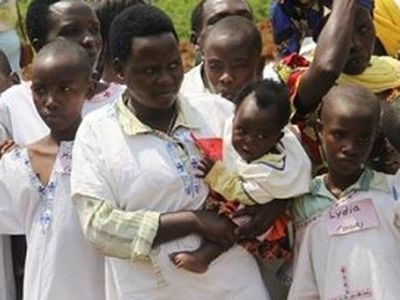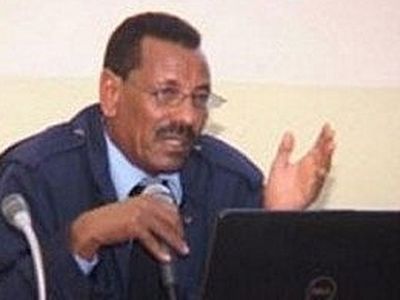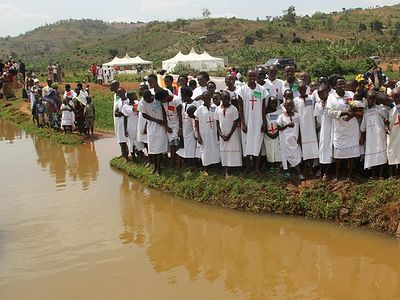Source: theguardian.com
In a predominantly Christian country terrorised by Muslim rebels as recently as January, Father Bernard Kinvi took his life in his hands when he resolved to protect Muslims threatened by sectarian violence. But the priest, who has won a Human Rights Watch award for his work, believes the conflict in CAR is misunderstood – and says his mission is far from over.
 Father Bernard Kinvi, who directs the hospital at the Catholic mission in Bossemptele, CAR, has offered shelter to Muslims. Photograph: Sarah Lee for the Guardian
Father Bernard Kinvi, who directs the hospital at the Catholic mission in Bossemptele, CAR, has offered shelter to Muslims. Photograph: Sarah Lee for the Guardian
The test of faith for which Father Bernard Kinvi had waited half his life arrived one January dawn when a heavily armed man with a necklace of talismans pulled up on a motorbike outside the Roman Catholic mission hospital in Bossemptele.
Despite being a member of the anti-balaka militia that has slaughtered thousands of Muslims in the Central African Republic (CAR), the rider had come on a mission of mercy.
He and his comrades had caught a Muslim man on a patrol the previous night and were planning to kill him. But he was having second thoughts and had come to ask Kinvi to plead for the man’s life. The militiamen, he said, would be too afraid of angering a priest to go through with their threats. Would he come?
Kinvi thought about it. On the one hand, he had never seen the armed visitor before, and knew well what the anti-balaka were capable of; on the other, a man’s life was at stake.
“So I went,” says the 32-year-old priest. “I prayed all the way on the back of the motorbike. I’ve never prayed so hard. I prayed and prayed. When we got to the village, some kids came out shouting, ‘He’s already dead! He’s already dead!’ I was too late. I couldn’t save him.”
Over the following three months, as CAR slipped deeper into chaos and carnage, Kinvi would be afforded ample opportunity to test his faith and his courage, as well as to save hundreds of Muslims.
The former French colony has been trapped in a cycle of sectarian violence, described by one UN official as “massive ethnic-religious cleansing”, since March 2013. That was when the mainly Muslim rebels of the Seleka alliance seized the capital, Bangui, and installed the country’s first Muslim president, Michel Djotodia.
The Seleka terrorised the country’s majority Christian population, killing men, women and children until they were forced from power in January. Their fall was swiftly followed by the rise of the predominantly Christian anti-balaka (anti-machete) militia, whose campaign of vengeance has resulted in the murder of thousands of Muslims and forced hundreds of thousands to seek refuge in neighbouring countries.
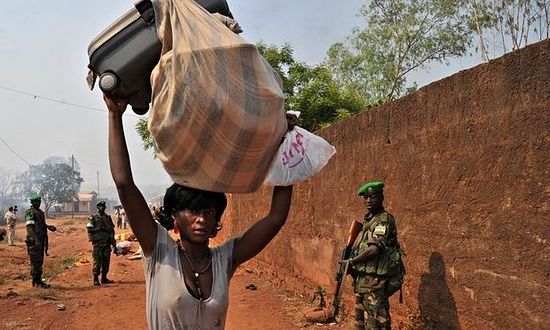 Rwandan peacekeeping troops look on as a woman in Bangui, CAR, flees after an attack by anti-balaka militia. Photograph: Issouf Sanogo/AFP/Getty Images
Rwandan peacekeeping troops look on as a woman in Bangui, CAR, flees after an attack by anti-balaka militia. Photograph: Issouf Sanogo/AFP/Getty Images
When the Seleka fled Bossemptele in January – taking Kinvi’s precious car with them – the anti-balaka swept into the north-western town, slaughtering 80 Muslims.
Kinvi responded to the threat by opening the doors of the mission to terrified Muslims and looking for those hiding in the bush.
Despite daily threats from the anti-balaka, who could not understand why a Catholic was defending Muslims, he continued sheltering them in the mission’s church, hospital and school.
“It wasn’t a decision; it was just something that happened,” he says. “As a priest, I cannot support the killing of a man. We’re all human: religion doesn’t come into it. If anti-balaka come in wounded, I treat them. I don’t care who you are or what you do with your life or what your religion is, you are a human being and I will treat you.”
At one point, 1,500 Muslims were living under the protection of a man whose only sources of power were his faith and the black cassock with a large red cross on the chest that he wears as a member of the Camillian order.
When he went out in search of bodies to bury, the anti-balaka would taunt him: “We have our jobs, father, and you have yours: we kill them and you bury them.”
From mid-January to April, Kinvi barely slept, terrified that if he closed his eyes the militia would fulfill their threats to murder all the Muslims in the mission.
But bit-by-bit, lorry load by lorry load, the priest started to get the Muslims out of the area and over the border into Cameroon.
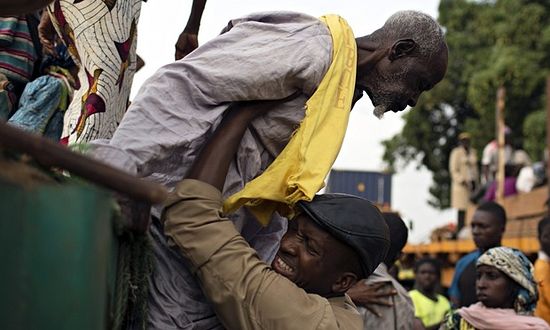 Father Bernard Kenvi helps a Muslim man climb down from an open truck in Bossemptele, Central African Republic. Photograph: Siegfried Modola/Reuters
Father Bernard Kenvi helps a Muslim man climb down from an open truck in Bossemptele, Central African Republic. Photograph: Siegfried Modola/Reuters
He was helping a mother climb on top of a truck one day when the driver sped off before he could pass up her baby. He gave the child to a teenage girl on the next truck but has no idea if mother and child were ever reunited.
After weeks of treating wounded anti-balaka fighters and building a relationship with their leaders, he noticed that the jeers and threats that had accompanied earlier evacuations were growing quieter. The once murderous hatred of Muslims had begun to fade.
“There was one day when I was scared about going out at night to evacuate the refugees,” he says. “I got to the roadside where there were 200 people. I saw groups of people around me who helped get them into the cars. They wore talismans round their necks, which meant they were anti-balaka, but they helped that day.”
He also noticed a change in himself. Kinvi, who began to feel a calling to the church as a 16-year-old in his native Togo, decided to become a priest three years later, after nursing his father through a long illness.
Yet in spite of joining the Camillians precisely because of their dedication to the sick, Kinvi had never appreciated the sacrifices that ministry might demand of him.
“When I became a priest, I undertook to serve the sick even if it meant putting my life in danger,” he says. “I said that but I didn’t really know what it meant. But when the war came, I understood what it means to risk your life. Being a priest is about more than giving blessings; it’s about standing with those who have lost everything.”
‘The contagion of love’
In March, African peacekeepers began evacuating Bossemptele’s Muslims and today, only a handful remain at the mission. Among them is Hamamatou Harouna, a 10-year-old girl with polio who was abandoned by her mother when the anti-balaka arrived. Harouna, who cannot walk and has to shuffle about on her hands and feet, would probably have died had her 14-year-old brother not picked her up, put her on his back and headed into the bush.
He took her as far as he could but eventually decided to put her down and seek help. But he never came back. When the anti-balaka found her a few days later, crawling through the bush, they joked that they had found an animal and not a person.
“She closed her eyes and asked herself how she would die,” says Kinvi. “Would it be a gun or a machete?”
The militia, however, took pity on Harouna, bathing and feeding her. After spending five months in a nearby parish, she was brought to Bossemptele where she studies and awaits the arrival of a wheelchair.
Kinvi takes such acts of compassion as evidence of what he calls “the contagion of love”.
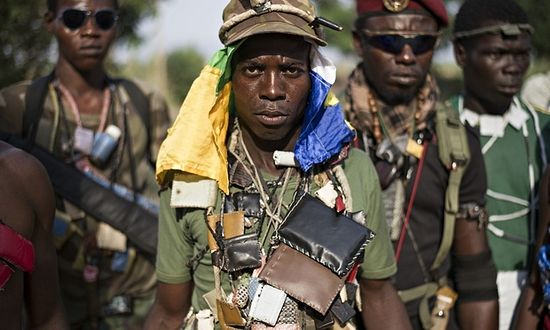 Anti-balaka militia in Bossemptele, Central African Republic, are slowly changing their attitude towards Muslims. Photograph: Fred Dufour/AFP/Getty Images
Anti-balaka militia in Bossemptele, Central African Republic, are slowly changing their attitude towards Muslims. Photograph: Fred Dufour/AFP/Getty Images
“At first, the anti-balaka went round killing Muslims one-by-one,” he says. “But I saw people protecting them and I saw the anti-balaka eventually realising that they shouldn’t be killing them. They came to their senses and started bringing Muslims to the missions. Some Christians hid Muslims in their houses and called us at night to come and get them.”
But although hundreds of Muslims are now safe and the panic in Bossemptele has given way to a fragile calm – “fragile because yesterday’s killers are still here today and they still have their guns” – Kinvi’s struggles are not yet over.
As well as being without a car and in charge of a hospital that serves an area the size of Switzerland on an annual budget of £100,000, the priest finds himself forced to confront what he sees as two particularly destructive strains of ignorance.
The first is that the slaughter in CAR was caused by a straightforward clash of Muslims and Christians. He rejects any suggestion that the anti-balaka he has dealt with are a Christian militia, arguing that if you look at their initiation rights and belief in talismans that render wearers invulnerable to bullets and blades, it is plain that they are animists. Besides, he adds, Christians would never have threatened a priest.
“That’s what annoys me when I listen to the radio or watch the TV: they talk about the anti-balaka as Christians but they’re not. A lot of the media think that if you’re not Muslim, you’re Christian. It’s not fair.”
The other grievance is a more familiar one: how could God allow such terrible things to happen in his name? “Lots of people say it’s all down to God. But don’t blame God, it’s humans being evil; God’s got nothing to do with it. It’s an abdication of responsibility.”
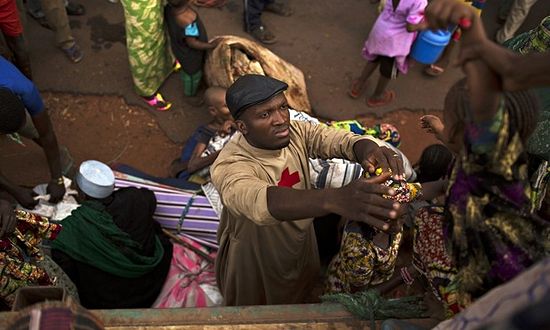 Father Bernard Kenvi helps a Muslim child climb down from an open truck in the town of Bossemptele, west of Central African Republic March 8, 2014, as a group of mostly women and children flee sectarian violence in a safer container truck in a convoy escorted by African Union (AU) peacekeepers. Photograph: Siegfried Modola/Reuters
Father Bernard Kenvi helps a Muslim child climb down from an open truck in the town of Bossemptele, west of Central African Republic March 8, 2014, as a group of mostly women and children flee sectarian violence in a safer container truck in a convoy escorted by African Union (AU) peacekeepers. Photograph: Siegfried Modola/Reuters
The mission has begun logging people’s stories so that the killers will one day face justice and the dispossessed and exiled will be able to reclaim what they have lost.
Kinvi’s efforts to protect the Muslims of Bossemptele have been recognised by the international NGO Human Rights Watch, which recently bestowed on him its Alison Des Forges award, which honours “people of valour who have put their lives on the line to create a world free from abuse, discrimination and oppression”.
But even Kinvi, an optimist whose near-constant smile is undimmed by the depravity he has witnessed, knows that CAR is far from free of that triple scourge.
For now, more than 400,000 of the country’s Muslims remain refugees outside its borders while almost 175,000 are displaced within them.
“I thirst for peace in CAR,” he says. “I want to see people able to move around safely like in any other country. I want to see my Muslim brothers, who have lost everything, return to their homes. It’s their country and they need to be back home.”
